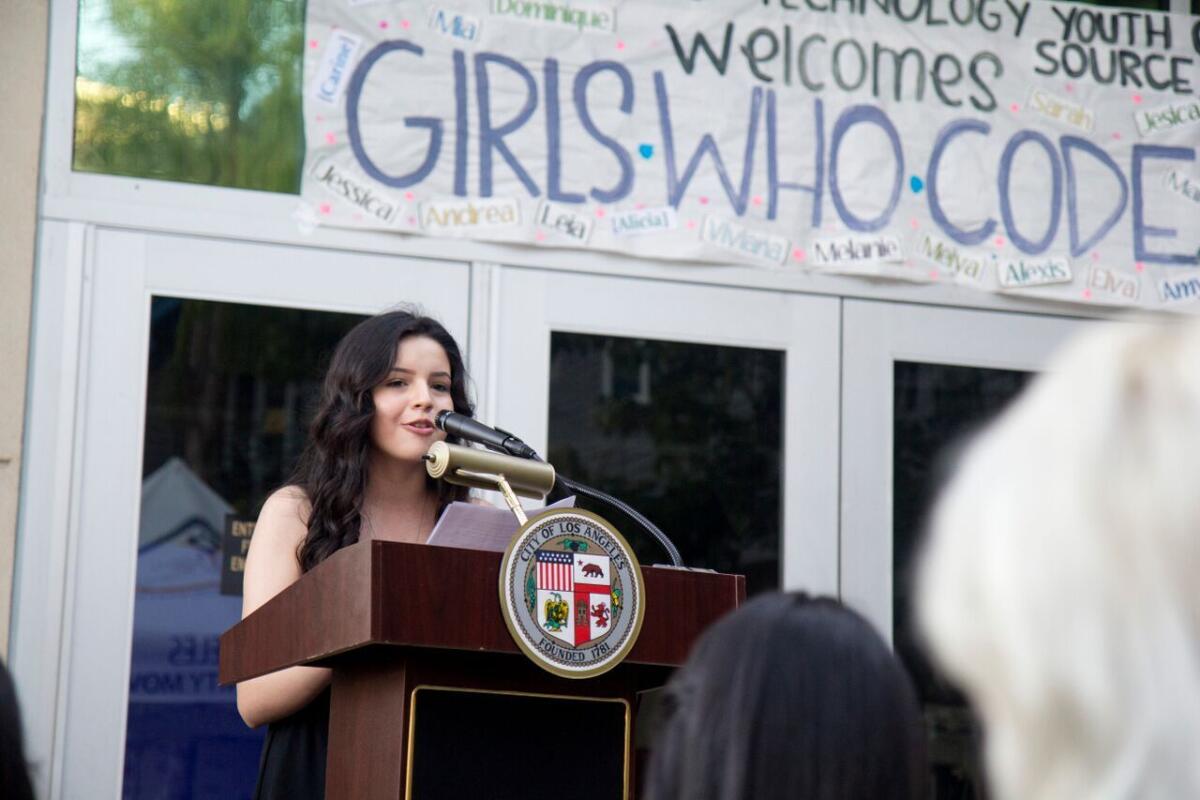Girls Who Code aims to make waves in a man’s world

Melanie Perez, 15, said she enjoyed finding girls who shared her ambitions and passions at Girls Who Code, a computer science summer program.
- Share via
Steve Jobs is a longtime role model for budding techies. But now he comes with an asterisk.
“I look up to Steve Jobs, but I see that he started everything in a garage with a bunch of men,” said Markie Wagner. “It’s hard to follow in exact footsteps.”
Wagner, who will soon turn 16, is a recent graduate of a computer science program for high schoolers called Girls Who Code.
------------
FOR THE RECORD
In the July 31 Business section, an article about the computer science program Girls Who Code said one of the summer sessions had taken place in Brentwood. It was held at the downtown Los Angeles campus of Mount Saint Mary’s University.
------------
Graduation ceremonies for the seven-week summer program were held this week, with awards like “Most Likely to Be My Boss One Day” and speakers including Mayor Eric Garcetti.
Tech-obsessed since age 9, Wagner, of Whittier, is still looking for female role models in a male-dominated industry. She hopes that the college-bound generation of young women, with the help of organizations like Girls Who Code, will spark change. Her own plans include launching a start-up when she gets to college, and filling it with women from diverse backgrounds.
“Hopefully, there’s going to be tons of new role models soon,” she said. “I’d love to be one myself.”
Reshma Saujani founded Girls Who Code in 2012 after learning that tech was the only major industry that had seen a dramatic decline in women employees over 30 years.
This summer, the nonprofit organization offered programs for 1,200 girls in 14 cities, including, for the first time, Los Angeles.
With sessions in Boyle Heights, Santa Monica, Venice and Brentwood, 80 girls participated tuition free. AT&T and Google were major sponsors along with the philanthropic Saban Family Foundation and Honest Co., which sells eco-friendly goods and is run by actress Jessica Alba.
Saujani said she crafted the program with a project-based curriculum designed to appeal to women.
“They’re problem solvers. And they’re passionate. And they care about humanity. There are so many tech solutions that could solve those things,” she said.
At one graduation ceremony in Boyle Heights, participants showed off apps and websites they had created from scratch in less than two weeks using programming languages such as HTML, CSS, jQuery and JavaScript.
They had business plans, too, and described how they would attract advertisers and sell the apps.
Many of the girls’ projects incorporated social services: First Jobs would curate job listings for high schoolers, Chronic Illness Connect would offer a platform for teenagers suffering from chronic ailments to share stories and support, and Global Grind would aim to teach about global warming through games, such as a “Frogger”-like design with penguins.
For Melanie Perez, 15, one of the program’s highlights was collaborating with two others on Global Grind, a project they plan to expand.
“They had the same ambition and the same passion that I have,” said Melanie, who lives in Koreatown and had not studied computer science before. Speaking at the graduation, she delivered half her speech in Spanish for her parents and other families from Latino backgrounds.
“I think it’s very important to have … that environment that pushes you to your max,” she added.
It’s not all coding at Girls Who Code. Networking with women is essential, too.
“We’ve all discussed how sometimes, you’re going to be the only woman in the computer lab,” said coder Mia Hamernik, 16, of Ventura County. “You have to find a way to set up your own network of support to get through that, just so you aren’t pushed out.”
These young women understand the challenges they’ll face when they move into the workforce.
Men outnumber women by 4 to 1, at least, in the technical sectors at big tech firms such as Google, Facebook and Apple, according to figures these companies released last year. The latest “diversity reports” don’t show much improvement.
And once women do land jobs, many eventually leave. A Harvard Business Review study found in 2008 that half of highly qualified women working in science, engineering and technology will, eventually, abandon their jobs because of hostile and isolating work environments. An update last year found that these women are 45% more likely than male colleagues to leave their fields.
For Carmen Nava, senior vice president of customer experience at AT&T, the solution could be getting girls committed during high school through programs like Girls Who Code.
“For us, honestly, the hardest thing is finding women in this field,” she said after the Boyle Heights graduation, where she was a speaker. “To expose them to all the joy of making something out of nothing, hopefully will help retain them.”
The girls aren’t spending all their time worrying about the future, though. They’re immersing themselves in code.
“You can look at a piece of code five hours, your eye goes over errors, and you miss a tiny semicolon,” said Wagner. “We’re all supportive in helping each other find that semicolon.”
Twitter: @dainabethcita
More to Read
Inside the business of entertainment
The Wide Shot brings you news, analysis and insights on everything from streaming wars to production — and what it all means for the future.
You may occasionally receive promotional content from the Los Angeles Times.









